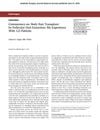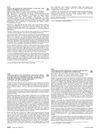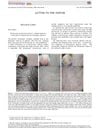13 citations,
June 2020 in “Plastic and reconstructive surgery. Global open” PRP preservation improves hair transplant results better than saline.
[object Object]  6 citations,
January 2018 in “PubMed”
6 citations,
January 2018 in “PubMed” Heavy metals might contribute to hair loss in Telogen Effluvium.
 5 citations,
March 2017 in “Biomedical and Pharmacology Journal”
5 citations,
March 2017 in “Biomedical and Pharmacology Journal” Certain growth factors significantly affect hair loss in women with telogen effluvium.
3 citations,
November 2021 in “Clinical, Cosmetic and Investigational Dermatology” Autologous cellular micrografts improve hair density and thickness in the short term for androgenetic alopecia.
 3 citations,
October 2021 in “Journal of Cosmetic Dermatology”
3 citations,
October 2021 in “Journal of Cosmetic Dermatology” Trichoscopy helps tell apart Frontal Fibrosing Alopecia and Lichen planopilaris by showing different hair and scalp features.
 2 citations,
March 2020 in “PubMed”
2 citations,
March 2020 in “PubMed” Biotin deficiency is not a major cause of Telogen Effluvium hair loss.
 1 citations,
April 2023 in “Biomolecules”
1 citations,
April 2023 in “Biomolecules” Fermented papaya and mangosteen in hair care products helped prevent hair loss and improve hair thickness.
 1 citations,
October 2021 in “Journal of the European Academy of Dermatology and Venereology”
1 citations,
October 2021 in “Journal of the European Academy of Dermatology and Venereology” The hair lotion reduced hair loss and sped up recovery in women with acute telogen effluvium.
 1 citations,
July 2017 in “Clinical research in dermatology”
1 citations,
July 2017 in “Clinical research in dermatology” Hair loss, known as Androgenetic Alopecia, is often caused by hormones and can be diagnosed using noninvasive techniques. Treatments include topical minoxidil and oral finasteride, with new treatments being explored. There may also be a link between this type of hair loss and heart disease risk.
 August 2023 in “Medicina-lithuania”
August 2023 in “Medicina-lithuania” Abusing steroids can damage your heart, muscles, reproductive system, liver, skin, and brain, and may increase the risk of Alzheimer's disease.
 May 2023 in “Journal of Clinical Medicine”
May 2023 in “Journal of Clinical Medicine” New understanding and treatments for hair loss are improving, but more research is needed.
 January 2022 in “Journal of Dermatology and Dermatologic Surgery”
January 2022 in “Journal of Dermatology and Dermatologic Surgery” Trichoscopy is useful for quickly diagnosing different types of hair loss without needing biopsies.
 July 2021 in “Indian journal of dermatopathology and diagnostic dermatology”
July 2021 in “Indian journal of dermatopathology and diagnostic dermatology” Trichoscopy is a reliable method for diagnosing hair and scalp disorders quickly and non-invasively.
 March 2020 in “Clinical research in dermatology”
March 2020 in “Clinical research in dermatology” Two unusual cases showed that Lichen Planopilaris can look like other skin conditions and need early treatment to protect hair.
[object Object] January 2023 in “Dermatologic Therapy” Androgenetic alopecia significantly affects mental health and quality of life, highlighting the need for psychiatric evaluations.
December 2022 in “Molecular Pharmaceutics” Latanoprost-loaded nanotransfersomes could help treat hair loss by promoting hair growth.
 January 2022 in “Surgical and Cosmetic Dermatology”
January 2022 in “Surgical and Cosmetic Dermatology” People with androgenic alopecia (AGA) have a higher chance of getting metabolic syndrome.
May 2021 in “F1000Research” The treatment led to denser, thicker hair growth and less hair loss.
January 2019 in “Journal of the Egyptian Women's Dermatologic Society (Print)” People with androgenetic alopecia have a higher risk of heart disease.
 1 citations,
June 2016 in “Aesthetic Surgery Journal”
1 citations,
June 2016 in “Aesthetic Surgery Journal” Body hair is a safe and effective option for hair transplants when scalp hair is limited.
 May 2020 in “Hair transplant forum international”
May 2020 in “Hair transplant forum international” Most Indian men aged 50-55 have a safe area for hair transplants, but selection should be careful to avoid overharvesting.
 August 2018 in “Journal of The American Academy of Dermatology”
August 2018 in “Journal of The American Academy of Dermatology” Aging significantly affects the hair and scalp of nonbalding Caucasian women, with changes that differ from male pattern baldness.
 December 2020 in “Skin appendage disorders”
December 2020 in “Skin appendage disorders” A young man with an unusual type of scarring hair loss suggests a possible new variant of a known scalp condition.
 10 citations,
March 2007 in “Dermatology”
10 citations,
March 2007 in “Dermatology” Sex-determining genes may affect male baldness.

Human scalp hair follicles have PGE2 and its receptors, which might affect hair growth.
 4 citations,
November 2020 in “BMC Dermatology”
4 citations,
November 2020 in “BMC Dermatology” Researchers identified genes in scalp hair follicles that may affect hair traits and hair loss.
2 citations,
February 2023 in “Actas Dermo-Sifiliográficas” Baricitinib effectively improved both atopic dermatitis and alopecia areata symptoms in a patient.
 81 citations,
March 2009 in “Seminars in Cutaneous Medicine and Surgery”
81 citations,
March 2009 in “Seminars in Cutaneous Medicine and Surgery” Effective hair loss treatment in women requires correct diagnosis and can include medications like minoxidil, antiandrogens, and treatments for underlying conditions like PCOS.
 July 2021 in “Australasian Journal of Dermatology”
July 2021 in “Australasian Journal of Dermatology” The trichoscopy-assisted hair pull test is useful for diagnosing different types of hair loss.
 August 2018 in “Journal of The American Academy of Dermatology”
August 2018 in “Journal of The American Academy of Dermatology” The moisturizing cream used after a chemical peel was well tolerated and effectively moisturized the skin.






















